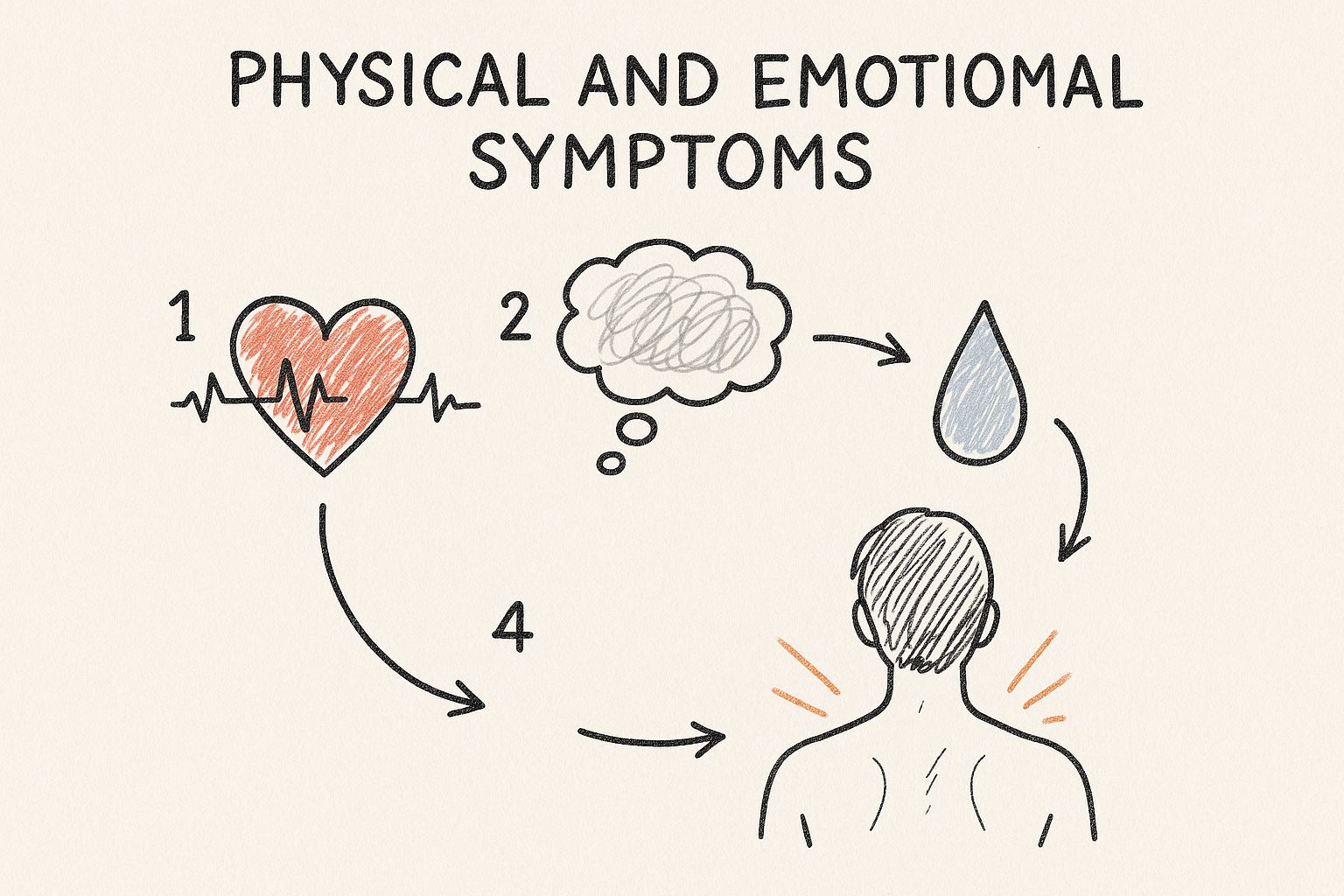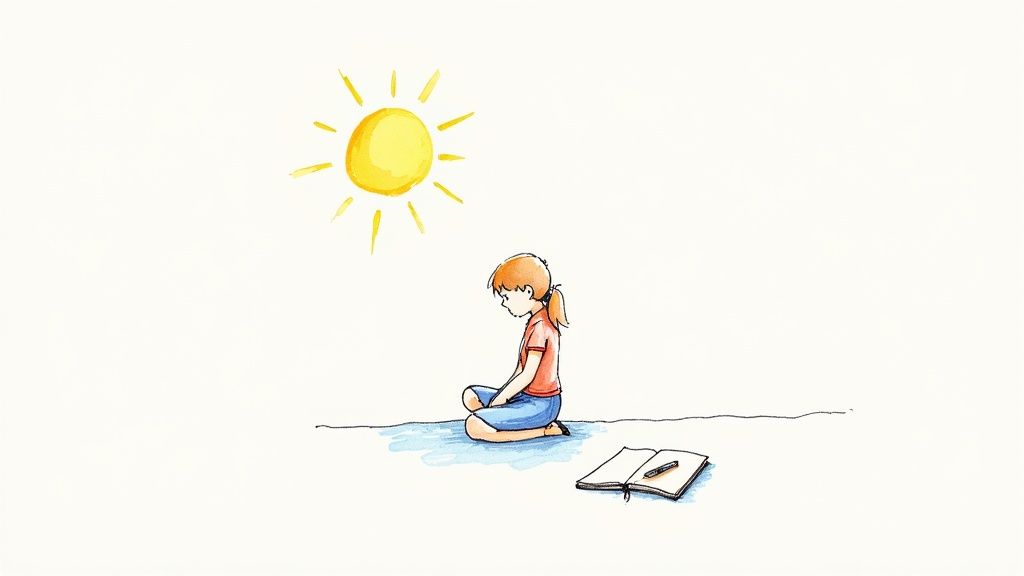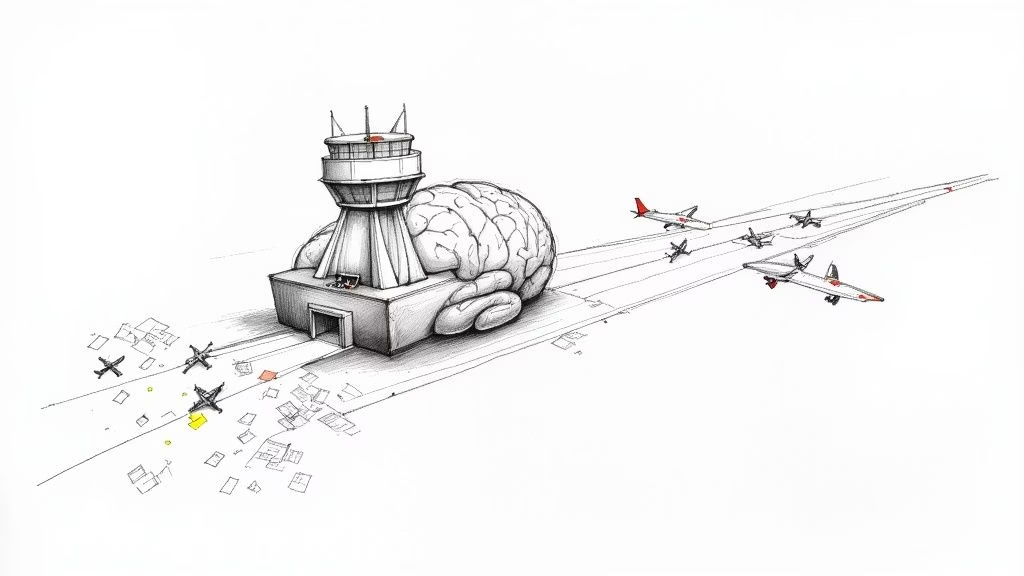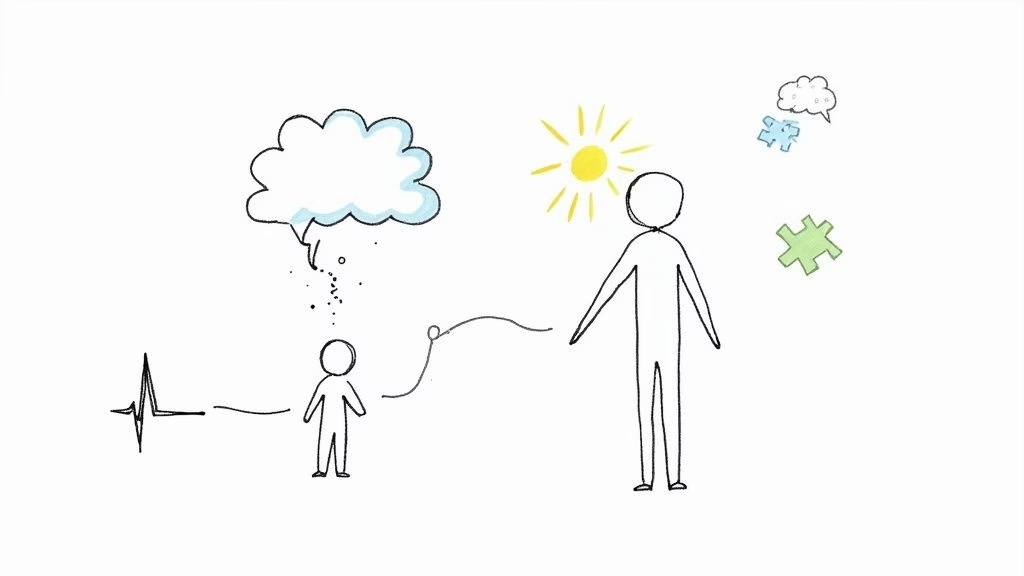Navigating teen anxiety can feel like trying to find your way in the dark. It’s overwhelming for everyone involved. But here's the good news: helping a teen with anxiety starts with a few foundational things you can absolutely do. It's about validating their feelings, opening up real lines of communication, and building a toolkit of coping skills together.
This guide is designed to give you actionable, practical strategies to manage stress, move past procrastination, and build resilience.
Why Is Everyone So Anxious? Understanding the Teen Anxiety Epidemic

Let's be real for a moment. Being a teenager today is a whole different ballgame. The pressure is coming from all sides—crushing academic expectations, the highlight reel of social media, and a constant hum of global uncertainty. It’s a perfect storm for anxiety. This isn't just "teen angst" we're talking about; it's a serious mental health challenge that millions are facing.
The statistics are pretty sobering. This isn't just a local issue; it's a global one. Research from the World Health Organization shows that around 1 in 7 adolescents aged 10-19 experiences a mental health disorder. Anxiety, alongside depression, is a leading cause of illness and disability for this age group, underscoring the urgent need for support.
This research highlights a critical point: if your teen is struggling, they are far from alone. This is a shared challenge that we need to face head-on with empathy and effective strategies.
So, Why Is Teen Anxiety on the Rise?
It’s not just one thing, but a combination of modern pressures. Academic stress has become relentless. Teens feel like they're in a constant race to perform, get the best grades, and secure a future that feels increasingly uncertain. That pressure doesn't just stay at school; it comes home and creates a ton of tension and burnout.
Then you add social media to the mix. It's a non-stop feed of curated perfection, making it almost impossible not to compare your real life to someone else's highlight reel. This constant comparison and fear of missing out can fuel deep feelings of inadequacy and loneliness.
And let’s not forget about sleep—or the lack of it. A tired mind is a breeding ground for racing thoughts and emotional reactivity. When teens aren't getting enough quality rest, their ability to cope with daily stressors plummets. I dive deeper into this in my guide on the connection between sleep and mental health for teens.
A Quick Look at the Strategies We'll Cover
Before we dive in, here’s a snapshot of the practical, actionable support this guide offers for both teens and their parents. We're moving past the "why" and into the "how."
| Strategy Area | Focus for Teens | Focus for Parents |
|---|---|---|
| In-the-Moment Coping | Building a hands-on "anxiety toolkit" with grounding techniques and a guided meditation guide to manage immediate stress. | Learning how to co-regulate with your teen and create a calm, supportive environment during tough moments. |
| Communication | Finding the words to express what they're feeling and asking for the specific support they need. | Developing compassionate listening skills, validating their experience, and opening up judgment-free dialogue. |
| Healthy Habits | Tackling school stress, procrastination, and motivation issues with practical systems that work with their brain, not against it. | Modeling healthy coping mechanisms and setting realistic expectations to reduce household pressure. |
| Targeted Support | Providing specific resources and meditation guides for young men and teen boys, who often face unique societal pressures to hide their struggles. | Understanding the unique signs of anxiety in boys and learning how to encourage them to open up through effective parenting tips. |
This is about building skills, not just talking about problems. Together, we can create a supportive framework that empowers teens to navigate their anxiety with confidence. Let's get started.
Building Your Anxiety Toolkit: In-The-Moment Strategies
When anxiety spikes, it feels like an alarm is blaring in your head and body. In that moment, you don't need a five-year plan; you need something that works right now. This is where your personal anxiety toolkit comes in—a set of simple, effective strategies you can pull out anytime, anywhere.
These tools are designed to pull you out of the overwhelming "what if" spiral and ground you firmly in the present. One of the most powerful places to start is with your breath. It acts as an anchor when everything else feels chaotic.
Guided Meditation for Instant Calm: A Guide for Teens
Meditation doesn't have to be some complex, hour-long practice. It’s really just about paying attention. The next time you feel that familiar knot of anxiety tightening, find a quiet moment and try this simple meditation guide. You can do it at your desk, in a crowded hallway, or even in the bathroom. No one has to know.
- Breathe In: Close your eyes or just soften your gaze. Slowly inhale through your nose for a count of four, feeling the air fill your lungs.
- Hold Gently: Hold that breath for a count of four. Don’t strain; just pause.
- Breathe Out: Exhale slowly through your mouth for a count of six, letting your shoulders drop as you release the air.
- Repeat: Keep this cycle going for just one or two minutes. Your only job is to focus on the counting and the feeling of your breath.
This simple exercise, often called box breathing, is a powerful way to interrupt your body's fight-or-flight response. For parents, practicing this alongside your teen can be a game-changer. It models a calm response to stress and shows them that these feelings are manageable.
The image below gives a glimpse into the physical and emotional symptoms that these quick strategies can help soothe.

This visual is a great reminder that anxiety isn't just "in your head." It’s a full-body experience that needs tools that can address both the racing thoughts and the physical tension that comes with them.
Ground Yourself with the 5-4-3-2-1 Method
When your mind is racing a million miles a minute, grounding techniques are your best friend. They reconnect you with your physical surroundings, which is exactly what you need when you're lost in worry. The 5-4-3-2-1 method is one of the best because it forces you to focus outward instead of inward.
Here’s how it works. Take a quiet moment and, either out loud or just in your head, name:
- 5 things you can see (a crack in the ceiling, a blue pen, a scuff on your shoe)
- 4 things you can feel (the texture of your jeans, the cool surface of a desk, your feet flat on the floor)
- 3 things you can hear (the hum of a computer, distant chatter, your own breathing)
- 2 things you can smell (your coffee, a pencil, hand sanitizer)
- 1 thing you can taste (the lingering taste of your breakfast or just a sip of water)
This sensory scan is so effective because it breaks the anxiety cycle by pulling your attention back to the concrete reality of your environment.
Remember: The goal isn't to eliminate anxiety forever—that's not realistic. The goal is to build the confidence that you can handle it when it shows up. These tools put you back in the driver’s seat.
Navigating School Stress, Motivation, and Procrastination

Anxiety and procrastination are a frustrating duo. I see it all the time. A big project or test looms, and the anxiety makes the task feel so monumental that a teen doesn't even know where to begin. That lack of motivation and paralysis leads directly to procrastination, which then fuels even more anxiety as the deadline gets closer. It's a vicious cycle that leaves so many teens feeling stuck and completely overwhelmed.
The first step toward breaking free is understanding this link. Anxiety isn't a sign of laziness; it’s often a deep-seated fear of failure or the feeling of being totally swamped. This is a widespread experience—data shows that 31.9% of U.S. adolescents have an anxiety disorder, with many finding it messes with their daily life and school performance. You can see the full breakdown on the prevalence of teen anxiety from South Denver Therapy.
Breaking Down the Overwhelm
When a task feels too big, the brain's natural response is often to just avoid it. It’s a self-preservation tactic. The key is to make the task smaller.
Instead of a teen thinking, "I have to write this entire research paper," help them break it down into tiny, manageable steps. Seriously, make them almost laughably small.
Their list might look something like this:
- Choose a topic.
- Find three good sources online.
- Write a one-paragraph outline.
- Write just the introduction.
Each checked-off item is a small victory that builds momentum. This approach transforms an intimidating mountain into a series of small, climbable hills, making it so much easier to just start.
Mastering Motivation with Focused Bursts
Long, unstructured study sessions are a recipe for distraction and burnout. A far more effective method is the Pomodoro Technique, which uses a timer to break down work into focused intervals. I swear by this, both for myself and the teens I coach.
Here’s the simple breakdown:
- Pick one—and only one—task.
- Set a timer for 25 minutes.
- Work on that single task without interruption. No phone, no other tabs.
- When the timer rings, take a short 5-minute break. Stretch, get a snack, listen to one song.
- After four of these "Pomodoros," take a longer break of 15-30 minutes.
This method works because the commitment feels small. It's just 25 minutes! It also trains the brain to focus intensely for short periods, which builds concentration over time. For more practical ways to handle academic pressure, check out our guide to stress management techniques for students.
Parenting Tips for Fostering a Growth Mindset
For parents, watching your teen struggle with school stress is tough. Your support can make a huge difference, but how you offer it is everything. The goal is to empower them, not add more pressure.
The key is to shift the focus from performance to progress. Praising effort ("I can see how hard you worked on that draft") instead of just results ("You got an A!") helps build a growth mindset. This is where challenges are seen as opportunities to learn, not as threats to their self-worth.
Help create a calm, designated study space that's free from distractions. But most importantly, model healthy coping strategies yourself. When you handle your own stress with patience and a positive outlook, you're showing your teen, not just telling them, that it's possible to navigate challenges without being consumed by them.
It’s tough watching your teen struggle with anxiety. As a parent, your first instinct is probably to jump in and try to fix whatever is wrong. But I’ve learned that sometimes the best thing you can do is simply create a safe space for them to land. It all starts with how you talk to them.
When your teen comes to you with a worry, it’s easy to say something like, "It's not a big deal." But that can shut them down. Instead, try validating what they’re feeling. A simple, "That sounds incredibly stressful; tell me more about it," can completely change the conversation. It shifts you from being a judge to being an ally, showing them that you’re on their side and that their feelings are real.
Fostering an Environment of Openness
You want to build a home where being vulnerable is a sign of strength, not weakness. A huge part of that is modeling it yourself. Let your teen see you go for a walk after a stressful day. Talk openly—and constructively—about your own frustrations. This shows them that anxiety is a normal part of life, something you manage rather than hide.
Simple routines can also make a huge difference. Setting clear, consistent boundaries around things like screen time and sleep isn't about punishment. It's about creating structure. For a teen with an anxious brain, that kind of stability and rest is exactly what they need to feel grounded.
The goal isn't to get rid of your teen's anxiety. It's to give them the tools and support they need to manage it. Your calm, steady presence is the most powerful anchor you can offer when they're caught in a storm of worry.
Mental Health Resources for Teen Boys and Young Men
Society has a way of telling teenage boys to "man up" and just push through their feelings. It’s a message that gets repeated so often they start to believe it. This pressure makes it incredibly difficult for them to talk about what they're really going through, causing anxiety to show up in ways that are easy to misread—like snapping at you, getting irritable over small things, or just hiding out in their room all day.
If you’re a parent, this means you have to learn to read between the lines. When your son is constantly on edge or seems to be pulling away from everyone, it’s rarely just a "bad attitude." More often than not, it's a signal that something deeper is going on.
Creating a space for connection without making it a big, intimidating "talk" is key. Try suggesting something active, like shooting hoops in the driveway or going for a run. It takes the pressure off and creates a more natural environment where conversation can flow without feeling forced.
Finding Safe Spaces, Men's Groups, and Relatable Voices
The good news is, things are slowly starting to shift. The conversation around men's mental health is getting louder, and there are more resources out there than ever before. Many organizations are now focused on creating spaces where young men can be honest without worrying about being judged.
- Men's Groups: Organizations like The Mankind Project create structured environments where men and boys can explore what healthy masculinity really looks like. These groups offer positive male role models who show that being vulnerable is actually a sign of strength, not weakness.
- Online Communities: Platforms like HeadsUpGuys are built specifically for men dealing with depression and anxiety. They offer practical information, personal stories from guys who've been there, and self-check tools that make it feel less isolating.
- Mentorship Programs: Connecting teen boys with a mentor can provide a crucial source of guidance and support outside the family. A trusted adult can offer a different perspective and model healthy coping skills.
One of the most powerful things a parent can do is just listen without jumping in to fix the problem. A simple, "Man, that sounds really tough," validates their feelings and can be the key that opens the door to a real conversation.
Simple Meditation and Motivation Guide for Young Men
When anxiety takes over, motivation is often the first thing to go—especially when it comes to schoolwork. It’s important to remember that procrastination isn't about being lazy; it's a symptom of feeling completely overwhelmed. A quick, simple meditation can be enough to hit the reset button.
A 2-Minute Grounding Exercise:
- Find a comfortable spot to sit and close your eyes.
- Breathe in slowly for a count of four, feeling your lungs expand.
- Hold that breath for a count of four.
- Breathe out slowly for a count of six, letting go of any tension in your shoulders or jaw.
- Repeat this five times.
This quick breathing exercise is powerful because it interrupts the body's physical stress response, making it easier to refocus and tackle that thing you've been avoiding.
For a deeper dive into how to support young men, you can learn more about teen boys' mental health and the need for real-world mentorship. By giving them practical coping skills and connecting them with supportive communities, we can help teen boys build the resilience they need to not just get by, but to truly thrive.
Frequently Asked Questions About Teen Anxiety
When you're dealing with teen anxiety—whether you're the teen or the parent—it’s easy to feel lost. Getting straightforward answers to your questions can be a huge relief and a great first step. Let's clear up some of the most common ones I hear.
What's The Difference Between Normal Stress and an Anxiety Disorder?
This is a big one. Normal stress is temporary and tied to something specific, like a big exam or a school presentation. It can even be a good thing, giving you that little push you need to study or practice. It comes, and then it goes.
An anxiety disorder, on the other hand, is a whole different beast. It’s when that worry becomes persistent, excessive, and feels completely out of proportion to what’s actually happening. It sticks around and starts interfering with everyday life—school, friendships, family. It's a constant, heavy feeling that doesn’t just go away when the test is over.
How Can I Talk to My Teen About Anxiety Without Them Shutting Down?
The key here is to come from a place of curiosity, not accusation. Instead of cornering them with a statement like, "You seem so anxious lately," try a softer, more observational approach.
Something like, "I've noticed things seem really tough right now, and I just want you to know I'm here," can open the door without putting them on the defensive.
Timing is everything. Don't plan a big, formal sit-down. Instead, bring it up casually during a drive, a walk, or while you're doing something together. Ask open-ended questions and then—this is the most important part—just listen. Your goal isn't to fix it all in one conversation; it's to create a safe space for them to share.
Are There Free Resources For Anxiety Help For Teens?
Yes, absolutely. You don't have to spend a fortune to get good support. A great place to start is often the school counselor, whose services are completely free for students.
Beyond that, there are some excellent non-profits and online platforms that can help:
- Crisis Text Line: This is a free, 24/7 support line. Just text HOME to 741741. It’s confidential and immediate.
- Guided Meditations: You can find a ton of free guided meditations specifically for teens on YouTube. Apps like Headspace or Calm also have a lot of great free introductory content.
- Informational Websites: Organizations like The Jed Foundation and the National Alliance on Mental Illness (NAMI) offer fantastic, reliable guides and articles.
My Teen Is Struggling With Motivation and Schoolwork. What Can I Do?
Procrastination and a lack of motivation are often just symptoms of anxiety. When a teen feels overwhelmed, their brain basically hits the brakes. Instead of focusing on the outcome (getting the assignment done), try shifting the focus to the process.
Help them break down huge tasks into tiny, manageable steps. Seriously, make the first step something as small as "open the book."
Praise their effort, not just their grades. Creating a calm, predictable study environment can also work wonders by reducing the mental clutter that anxiety thrives on. Sometimes, just doing a simple two-minute breathing exercise before starting homework can clear their head enough to get the ball rolling.
What About Resources for Young Men and Teen Boys?
This is such an important question. Teen boys often face a unique pressure to tough it out and suppress their emotions, which can cause anxiety to show up as anger, irritability, or complete withdrawal. Finding resources where they feel seen and understood is crucial.
Creating connection is the first step. For some young men, traditional therapy can feel intimidating. Men's groups, mentorship programs, or even online communities like HeadsUpGuys create spaces where boys can see healthy vulnerability modeled by positive male figures. These resources help redefine strength and encourage emotional honesty.
At Andrew Petrillo Life Coaching, I get the unique challenges teens are up against today. If you're looking for personalized, practical strategies to help your teen move past anxiety, build real confidence, and start thriving, I'm here to help.
Schedule a complimentary discovery call to see how one-on-one coaching can make a real difference.



















